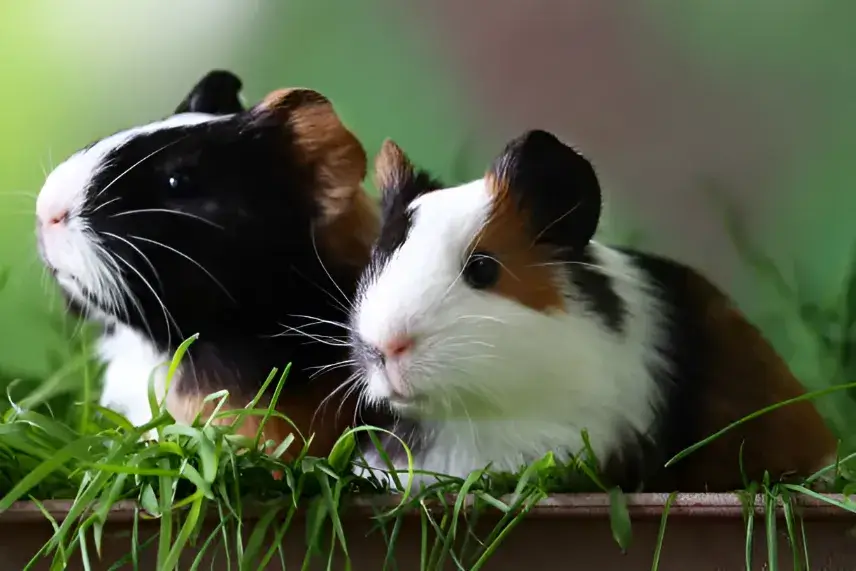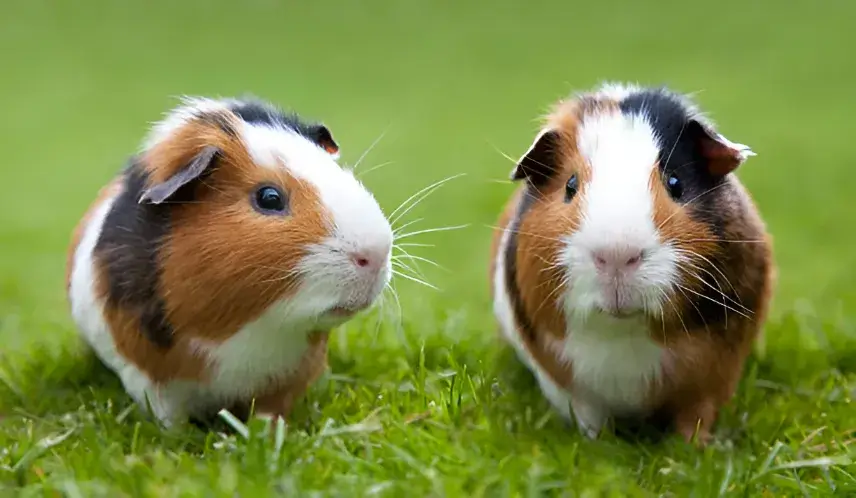Guinea pigs have delicate digestive systems designed for constant grazing. If they stop eating for even a few hours, their health can be seriously compromised. After 6-8 hours, the risks increase significantly, and within 12-24 hours, the situation can become life-threatening.
Why Eating Constantly is Vital for Guinea Pigs
Grass Machines: Guinea pigs evolved as grazers, eating low-calorie grass and hay all day. Their bodies are built for continuous digestion.
Preventing Gut Stasis: If they stop eating, their digestive tract slows down. This can lead to gut stasis, a life-threatening condition where food stops moving entirely, and harmful bacteria take over.
Sensitive Teeth: Guinea pigs’ teeth grow constantly. Chewing hay wears them down naturally. Without hay, teeth can overgrow, making eating painful or impossible.
Signs Your Guinea Pig Isn’t Eating Enough
Fewer poops: Healthy guinea pigs poop a lot! Decreased pooping or smaller, harder poops are red flags.
Lethargy: Is your usually active piggy seeming sluggish or not wanting to play?
Weight Loss: Regular weigh-ins are crucial. Sudden weight drops suggest a problem.
No interest in treats: Even sick guinea pigs will often perk up for their favorite treats. A refusal is worrying.
What to Do if Your Guinea Pig Won’t Eat
Vet Visit ASAP: Don’t delay, especially if it’s been over 12 hours. Guinea pig health declines rapidly.
Syringe Feeding: Your vet may instruct you on this. Use a recovery food like Critical Care (not just veggies).
Address Causes: Illness, dental issues, or stress can all cause appetite loss. Your vet will help pinpoint the reason.
Preventing Eating Problems

Unlimited Hay: This should be 80% of their diet. Timothy hay is ideal for adults, and alfalfa for youngsters.
Fresh Veggies: Offer a 1-cup mix daily with high vitamin C options like bell peppers.
Pellets in Moderation: Choose a plain, timothy-based pellet, about 1/8 cup per day.
Fresh Water: Change the water daily, even if the bottle isn’t empty.
Myths and Misconceptions About Guinea Pig Eating
Many guinea pig owners have heard well-meaning but inaccurate advice. Let’s clear up some common myths:
Myth: “Guinea pigs can go a day without food just fine.”
- Fact: Even a short break in eating can lead to digestive issues. Monitor closely if they skip a meal.
Myth: “Lettuce is the best food for guinea pigs.”
- Fact: Lettuce is mostly water and low in nutrients. Offer a variety of veggies, prioritizing those rich in vitamin C.
Myth: “Vitamin C drops in water are enough.”
- Fact: Guinea pigs need a combination of fresh veggies and high-quality pellets to get sufficient vitamin C. Drops can degrade quickly.
Step-by-Step Guide: What To Do If Your Guinea Pig Isn’t Eating
Step 1: Be Observant: Note when you last saw your guinea pig eating normally and how often they usually poop.
Step 2: Look for Worrisome Signs: Check for a swollen or hard abdomen, extreme tiredness, or urine stains around their bottom (which could indicate a bladder issue).
Step 3: Don’t Delay, Call Your Vet: This is especially important if it’s been more than 12 hours since they ate. Have details about their usual food, poop habits, and energy levels on hand.
Step 4: Get Ready for the Vet: Bring a sample of their hay and a comforting item like a favorite toy to help reduce stress.
Conclusion
Guinea pigs are designed to eat around the clock! It’s not just about hunger; long gaps in eating create serious health risks – often quickly. Knowing the warning signs and acting fast can be a literal lifesaver for your furry friend.
The photo featured below the post headline is Credit: Wayne Shipley/gettyimages
I hope you find this post helpful and informative. If Yes’ feel free to share it with your friends!
Frequently Asked Question
My guinea pig only ate half its dinner. Is this okay?
Monitor them closely for the next few hours. Sometimes they take breaks and finish later. However, if uneaten food remains in the morning, call your vet for guidance.
How do I know if my guinea pig has gut stasis?
No pooping for 12+ hours, a bloated/hard belly, hunched posture, teeth grinding, and seeming extremely lethargic are signs. Get to an emergency vet immediately.
Can I prevent this from happening again?
Absolutely! A proper diet, regular vet check-ups, and minimizing stress all lower the risks of future eating problems.
How long can a guinea pig go without food before it dies?
Sadly, there’s no one-size-fits-all answer. A guinea pig’s age, underlying health conditions, and the specific reason for not eating all impact how long they can survive. However, time is of the essence, and seeking veterinary help quickly is essential.
Is it normal for guinea pigs to stop eating sometimes?
They may momentarily seem less interested in food, but a complete refusal of all food for over 6-8 hours is not normal and warrants vet attention.
How can I encourage my sick guinea pig to eat?
Try offering favorite foods cut into smaller pieces, hand-feeding, or warming up veggies slightly. Your vet may also advise on syringe-feeding techniques.
Can guinea pigs go a few days without pellets?
While hay and vegetables are their primary diet, pellets provide important nutrients. A few days without them is unlikely to cause immediate harm, but it’s best to reintroduce them as soon as your guinea pig’s appetite returns.
Can I leave my guinea pigs alone for 4 days?
No, this is not safe. Guinea pigs require fresh food and water several times daily, and their cages need spot cleaning at least once per day. Responsible pet care means finding a knowledgeable pet sitter or boarding facility that understands guinea pigs’ unique needs.
How do I know if my guinea pig is starving?
Besides not eating, look for rapid weight loss, desperation for any type of food, weakness, and changes in poop output.
Are guinea pigs supposed to eat 24/7?
While they don’t literally eat every minute, guinea pigs should have access to unlimited hay at all times. They’ll graze throughout the day and night as their digestion requires.
How long can guinea pigs go without water?
Dehydration becomes dangerous even faster than food deprivation. Ensure fresh water is always available and encourage drinking if they seem reluctant.

